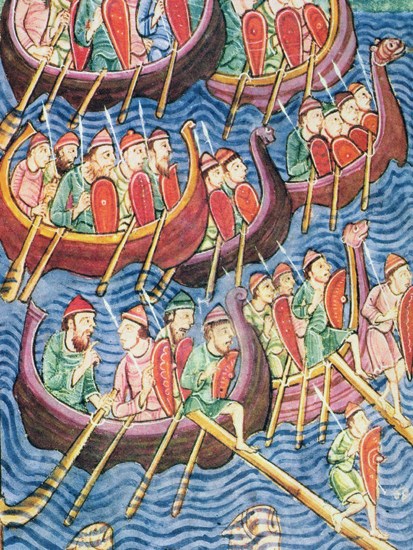The clue is in the title: this is not about the blue-grey-green wet stuff that covers 70 per cent of our planet’s surface. Rather, it’s about how the sea and our use of it have influenced us economically, culturally, religiously and politically:
Much of human history has been shaped by people’s access, or lack of it, to navigable water …. Life on the water — whether for commerce, warfare, exploration or migration — has been a driving force in human history.
Admitting that he wants to ‘change the way you see the world’, Lincoln Paine also claims that ‘The past century has witnessed a sea change in how we approach maritime history.’
He adduces a deal of evidence from times ancient and modern to show how the sea has at once protected and exposed, enabled and frustrated, attracted and repelled us. Nowadays, with more sea cruises annually than before the jet age and with the proliferation of leisure sailing, we have made a pleasure out of what was once a peril, yet 90 per cent of the world’s freight is still sea-borne.
For some civilisations the sea was formative. Five thousand years ago the Nile and the Mediterranean brought to the early Egyptians their vision of the afterlife, a conception of the state, political stability, a degree of domestic tranquillity, and economic and cultural intercourse with distant peoples. It also enabled them to perform useful tricks, such as moving 330-ton stone obelisks hundreds of miles. (They would bring the stone to the water’s edge on rollers, dig a channel beneath it to let the water in, load a barge with smaller stones, float it in beneath the obelisk, then unload the smaller stones until the barge had risen sufficiently in the water to bear the obelisk.)
The sea could also work against you, of course. Not only by drowning, flooding or isolating, but in exposing you to danger even while protecting you. We often think of our own sceptred isle as having been saved by the sea from Spanish, French and German invasion, as indeed it was. But between the fifth-century departure of the Romans and 1066 it was our long undefended coastline with its many estuaries that facilitated surprise attack and easy penetration by waves of Saxon and Viking invaders. Surprise would have been harder if they’d had to tramp across the area of the North Sea rather than materialise out of the dawn mists.
But the main drift of this learned and deeply researched book is that many human societies evolved as they did largely because of sea-contact with other societies.
The birth, expansion and longevity of pharaonic Egypt depended on harnessing the Nile … while the seas were a filter through which its people absorbed foreign goods and influences, a buffer against invasion and a thoroughfare for projecting political and military power.
Perhaps most significant for us and for the development of the western world was the seaborne diffusion of the Greek alphabet — ‘the last word in low-volume, high-value cargo and the most transformative agent of change in the ancient Greek world’. Along with the Phoenician original on which it was modelled, examples of the earliest Greek writing have been found not only in Greece but along the trade routes.
However, the sea wasn’t merely a helpful facilitator of communication and a conveyor of goods and services. It was, and remains, a home for pirates. It is unfortunate that we inherited the romantic image of these ruthless wealth-seekers as colourful and — nowadays — ‘deprived’, their predations thus almost justified. The Roman mind, as Paine shows, was less clouded by sentiment. Young Julius Caesar was captured and held for nearly 40 days before being ransomed for 12,000 gold pieces; but Caesar did not know Stockholm Syndrome and returned to crucify his captors. Possibly the most effective piracy suppression strategy in history was that of Pompey, who divided the Mediterranean into 13 naval districts, ordering the captain of each to destroy any pirates he found but not to leave his zone. One area, the coast of Cilicia, was left unguarded and swiftly became a refuge for survivors, upon which Pompey moved against it with his army. He is thought to have killed about 10,000 altogether, cleansing the western Mediterranean in only 40 days, while showing pragmatic clemency to those who surrendered at Cilicia. Transplanted to a nearby port, they became his loyal supporters in subsequent wars.
Important though it was, the Mediterranean is only part of the history of maritime development, known because some of the cultures it spawned left written records. Other seas and other cultures — in the Pacific, Atlantic and Indian oceans — were variously busy, particularly in the Far East, but scarcity of a written record makes some of their human histories harder to trace.
Paine is assiduous, however, in ferreting out evidence. Just as the spread of Judeo-Christian beliefs and Islam were partly seaborne, so, he notes, did the spread of Buddhism to China increase trade, despite Confucianist scorn of commerce. In the first few centuries AD there were maritime disputes involving Korea, China and Japan (as there are, ominously, between the latter two now). There is evidence, too, of ancient Chinese use of canals and of hydraulic engineering to control flooding and later of a Roman merchant at the Han court.
Somewhat later still, the development of the marine engine and vastly larger and safer ships transformed our use of the sea. It made possible ‘the greatest episode in human migration’ when 56 million Europeans emigrated between 1815 and 1930. Churchill’s 1912 insistence on a diesel-powered Royal Navy endowed oil with strategic importance and shaped the course of international relations into our own century.
Now, often under flags of convenience, the maritime industry increasingly operates without reference to national interests, fostering globalisation and cross-cultural interdependence as it has for millennia but on a much greater scale — one container ship can carry as much as was moved in a year across the Mediterranean in ancient times.
With containerisation and remote docking our sea trade is less visible than before but our reliance on it even greater. Now and again, though, we are reminded that although we ride those seas we do not master them — as recently, on the west of these isles, when Neptune gave us a little prod with his trident.
Got something to add? Join the discussion and comment below.
Get 10 issues for just $10
Subscribe to The Spectator Australia today for the next 10 magazine issues, plus full online access, for just $10.
Available from the Spectator Bookshop, £25. Tel: 08430 600033
You might disagree with half of it, but you’ll enjoy reading all of it. Try your first month for free, then just $2 a week for the remainder of your first year.














Comments
Don't miss out
Join the conversation with other Spectator Australia readers. Subscribe to leave a comment.
SUBSCRIBEAlready a subscriber? Log in